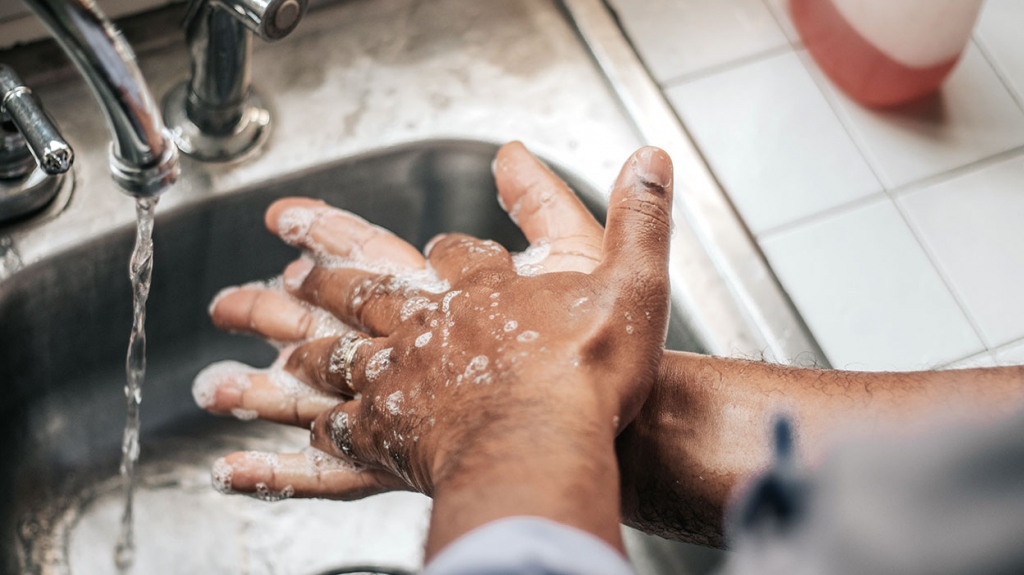GoodRx / Maryann Mikhail, MD

Do your hands look like they have aged 100 years since this pandemic started? Does the skin look dry and scaly? Red and irritated? Unfortunately, frequent hand washing can cause hand eczema to flare. The good news is it treatable with proper skin care and topical medications.
What is hand eczema?
Hand eczema, also known as hand dermatitis, is a common skin condition. It affects about 10% of the U.S. population. It can be genetic and/or triggered by something that comes into contact with the skin. People who have eczema in childhood (atopic dermatitis) are more prone to hand eczema. They might also have related conditions like hay fever and asthma.
Usually, hand eczema flares in colder temperatures. It can be itchy and painful. It is not contagious, but breaks in the skin from hand eczema can increase a person’s risk of getting an infection.
Irritation of the skin is a common trigger of hand eczema. Irritant hand eczema often affects people who need to wash their hands a lot or who handle chemicals at work. Water and chemicals break down the skin’s natural barrier and lead to inflammation.
Traditionally, irritant hand eczema affects healthcare, cleaning, catering, hairdressing, and mechanical workers. But because of the COVD-19 pandemic, it is affecting more people in the general public who are following the Centers for Disease Control and Prevention (CDC) guidelines for hand hygiene.
What are the symptoms of hand eczema?
In the beginning, hand eczema can be mistaken for dry skin. The difference is that in eczema, there is inflammation under the surface. A good moisturizer should be able to fix dry skin. But it is not necessarily enough to get rid of eczema.
Common symptoms of hand eczema are:
- Dry, chapped skin (often the first sign)
- Patches of red (or dark brown) irritated skin
- Scaly and inflamed skin that might itch
- Burning feeling in the hands
- Itchy blisters under the skin
- Deep, painful cracks
- Bleeding or oozing skin
- Scabs, pus, and pain
Skin care tips to help your hands
When washing your hands, you can protect them from eczema and other skin conditions by taking some basic steps.
- Choose the right cleanser: Wash your hands with a fragrance-free soap and water. Avoid using hand sanitizer when possible. Hand sanitizers contain ingredients like alcohol and solvents that can be harsh on skin. Don’t forget to remove rings before washing or using hand sanitizer. Soap and water can get trapped underneath and cause irritation.
- Avoid hot water: Washing your hands in hot water doesn’t work better. But it does damage your skin. Use lukewarm water to wash your hands and while in the shower.
- Be gentle: Avoid rubbing or scrubbing your skin too vigorously, as this can cause inflammation and skin breakdown. Dry your hands by gently patting them with a disposable, soft paper towel or tissue.
- Moisturize all the time: Apply a moisturizer right after washing your hands, while the skin is still damp. Reapply whenever your skin feels dry. Oil-based lotions and creams work to improve skin damage. Keep a tube near every sink and carry one in your bag so you don’t forget. Overnight, use petroleum jelly on your hands under cotton gloves.
- Use gloves to protect your hands: Use vinyl gloves with cotton liners for housework. This includes washing dishes, hand washing clothes, and using antiseptic wipes or cleaning products. You can also use them when shampooing or applying hair products. Wrapping rubber bands around your forearms prevents water from getting in. In cold temperatures, wear warm gloves whenever you go outside.


